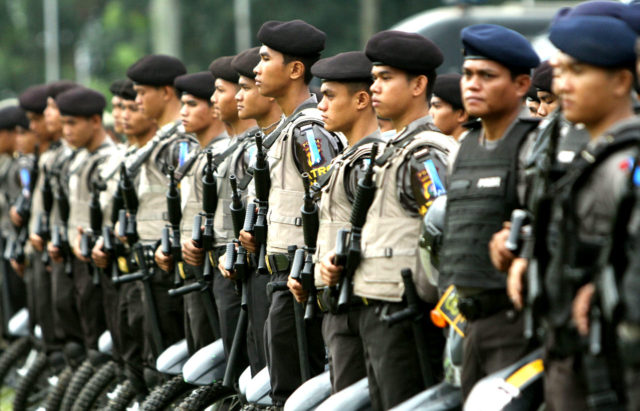
Briefs
Publication: Terrorism Monitor Volume: 15 Issue: 11
By:

Indonesia: Eyes on the Islamists
The Indonesian military has said it is beefing up defenses in parts of the country in anticipation of an expansion of Islamic State (IS) activities. That has included stepping up security in Ambon, Maluku and North Sulawesi, which lie south of the Philippines, in anticipation of terror attacks (Jakarta Post, May 31). The move has been prompted by events in the Philippines, were President Rodrigo Duterte has declared martial law in the southern island of Mindanao in order to tackle a relatively small number of IS-linked militants.
It also comes after five people were killed and 10 others injured in two suicide blasts at a bus station in Kampung Melayu, in East Jakarta on May 24 (Jakarta Globe, May 25). The blasts hit a parade welcoming the start of the Muslim holy month of Ramadan, but three of the five killed were police officers. It was the most deadly attack to hit the capital since January last year when four people were killed and 25 wounded in an attack by gunmen and a suicide bomber (see Hot Issue, January 27, 2016). That attack was attributed to Jamaah Ansharut Daulah (JAD), a collection of Indonesian militant groups that have sworn allegiance to IS. Police believe the bus station attack could be linked to the same network (Jakarta Post, May 25).
In the wake of the bus station attack, Joko “Jokowi” Widodo, Indonesia’s president, has hinted that the long-promised revision of the country’s 2003 terrorism law could give the military a greater role in tackling terrorism (Jakarta Post, May 30). Military officials have received this suggestion relatively enthusiastically (Kompass, May 30). But it is hotly debated by liberals skeptical of giving the army greater powers and fearful of the potential fallout from a heavy-handed response to the problem.
Meanwhile, there are political concerns over the growing influence of Islamists. On May 8, the government moved to ban the Indonesian chapter of Hizbut Tahrir, accusing it of acting against state values, or rather Indonesia’s foundational ideology of “Pancasila” (Jakarta Post, May 8). President Jokowi has since threatened to close down more organizations, and while he declined to name those that would be affected, they are likely to be Islamist (Tempo, May 31).
Hizbut Tahrir leaders were some of the loudest voices among a coalition of Islamists calling for the prosecution of Jakarta’s Christian former governor Basuki Tjahaja Purnama, known as Ahok, on blasphemy charges.
Last month, Ahok, an ally of President Jokowi, was jailed for two years (Jakarta Post, May 9). The sentence was condemned by international rights groups, but it highlights a trend over the last few years of growing religious intolerance in Indonesia. That is an area where greater military deployment cannot be effective, but one that needs to be addressed with similar drive if Islamist militancy is to be tackled.
Maldives: Saudi Influence and Rising Intolerance
The Maldivian blogger Yameen Rasheed was brutally stabbed and killed on April 23, the third prominent media figure to be targeted in the Maldives in recent years. While the murder comes against the backdrop of political turmoil, it may also highlight a growing strain of Islamist extremism in the country.
Rasheed was attacked as he was walking home from work. Police found him in the stairwell of his apartment building in the Maldivian capital of Malé with multiple wounds to his chest and neck (Maldives Independent, April 23). He later died in hospital.
The 29-year-old was well known for his blog “The Daily Panic,” in which he was both amusing and frequently critical of the Maldivian government and Islamist extremism. As a result of his writing, he received multiple death threats, which his family says he reported to the authorities on at least three separate occasions (Raajje TV, May 3). They believe the police failed to protect him and want some form of international inquiry into his death, a call echoed by the main opposition Maldivian Democratic Party.
What form such an investigation would take is unclear, but there is outside pressure on the Maldives to investigate Rasheed’s murder. Zeid Raad al-Hussein, the UN high commissioner for human rights, framed the killing in the context of a clampdown by Maldivian President Abdulla Yameen on political opponents and government critics (al-Jazeera, April 25). Islamist extremists are also in the picture.
The Maldives has witnessed an increase in extremism in recent years, both in terms of the number of Maldivian Islamists leaving to fight for jihadist causes abroad, as well as an increasing intolerance toward liberals at home. Local commentators blame this on the spread of Wahhabism — they stress it is a new phenomenon that runs contrary to the Sufi-inspired variety of Sunni Islam, which is more traditional to the Maldives (Maldives Independent, April 24).
The growth of Wahhabism is attributed to the increasing influence of Saudi Arabia. The two countries have grown closer under President Yameen. The Gulf Kingdom is a major investor in the Maldives, spending millions on infrastructure projects, but it also funds religious scholarships and a mosque-building program. During a visit to the Maldives last year, the speaker of Saudi Arabia’s shura council, Abdulla bin Mohamed bin Ibrahim al-Sheikh, donated $100,000 to the Islamic University of the Maldives (Maldives Independent, January 5, 2016). Earlier this year, a rumored government plan to sell a Maldivian island to a member of the Saudi royal family provoked political uproar (Maldives Independent, March 4).
For Saudi Arabia, the benefits of the relationship are diplomatic — the Maldives is counted among the members of the Kingdom’s anti-terrorism coalition, and in May last year Malé cut ties with Iran, essentially at Riyadh’s behest (Maldives Independent, May 17, 2016). The impact on the Maldives is more mixed. While economically beneficial, on a social level the relationship may still prove to be problematic.




